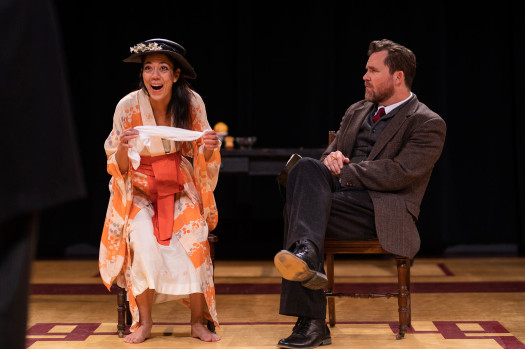Theater Review: Bedlam’s “Pygmalion” — An Enjoyable Excursion into Shavian Feminism
By Bill Marx
The generally enjoyable Bedlam production of Pygmalion doesn’t quite go for the glucose bait.
Bedlam’s Pygmalion by George Bernard Shaw. Directed by Eric Tucker. The Bedlam Theater Company production presented by the Underground Railway Theater at Central Square Theatre, Cambridge, MA, through March 3.

Vaishnavi Sharma and Eric Tucker star in Bedlam Theater Company’s production of “Pygmalion.” Photo: Nile Scott Studios.
As a Shavian, I have often entertained the wish to hop on stage and mingle with George Bernard Shaw’s characters. But I have never been given the opportunity — until now. Before Bedlam’s Pygmalion began, Vaishnavi Sharma, the show’s Eliza Doolittle, invited me and a few other audience members to leave our seats and stand about during the opening scene, which is set in Covent Garden. I seized on the opportunity. My critic’s notebook in hand — a faint echo of Professor Higgins? — I fired off a hammy look or two as Eliza (whose family, in this version, came to London via India) runs into Higgins who, on a bet with Colonel Pickering, engineers her linguistic transformation. It is a metamorphosis that raises serious issues about the embattled relationship between male and female, master and slave, colonizer and colonized. These are hot button issues for the #MeToo era and, understandably, are very much on the mind of Bedlam director (and the production’s Henry Higgins) Eric Tucker.
GBS saw the play as an attack on the patriarchy, and reacted with justified alarm to the My Fair Lady romanticization of Henry and Eliza. This is the story of a tussle between exploiter and exploited, with the latter coming out of the battle as the superior human being. Once his amusing experiment births a new Eliza, Henry figures he can dispose of his ‘improved’ product on the marriage market. Yet somehow he believes that this notion has nothing to do with economics or politics:
Liza: I sold flowers. Now youve made a lady of me I’m not fit for anything else. I wish youd left me where you found me.
Higgins: Tosh, Eliza. Dont you insult human relations by dragging all this cant about buying and selling into it.
Of course, what does Higgins know about “human relations”? He loves the privilege of being able to be beastly to everyone. But he is brutal to Eliza because he has no respect for her or her future, aside from assuming she will settle into some sort of servitude. Ultimately, he concludes that his beautiful guinea pig will be content, with an offer of sugared friendship, to trot back into his patronizing cage. Higgins’ sugar is also a part of Shaw’s (audience pleasing) dramatic strategy, and it poses complications for a staging. GBS has injected lots of charming comedy into his pointed fable of liberation, particularly the mischievous wit that leavens Higgins’ brainy arrogance. The trick is to serve the humor, robustly, yet to suggest the nasty hollowness underneath Higgins’ game.
The generally enjoyable Bedlam production doesn’t quite go for the glucose bait. But there is a disappointing tendency for the performers to cruise along at farce clip: the show runs two hours with no intermission. The staging revels in the awkward class and culture clashes, in the campiness of the actors (Edmund Lewis, James Patrick Nelson) who play drag, and in the high-octane energy of Sharma’s Eliza. This is one explosive flower girl! She is never vulnerable or uncertain. The character’s change has as much to do with controlling her inner whirlwind as it is with making her speech and behavior “respectable” for polite society. Perhaps that is the political angle the production is taking: Tucker’s Higgins is never bothered to control himself – he plays the role of a ‘bad boy’ teacher who loves to break the rules. He cannot change, only bask in his certitude. Eliza learns to discipline herself, so she can play more than one role. Perhaps she becomes so adept at repression here that we never quite see the affection Eliza bears for Higgins. In an interesting pair of contrasting scenes invented by Bedlam, we see the characters ‘dress up” for others: Eliza moves into her clothes with choreographic grace; Higgins pulls and yanks with impatience, leaving home with his suspenders unhooked.
Michael Dwan Singh’s genial Alfred Doolittle runs out of satiric steam when he makes his second appearance. Tucker is fine as Higgins, but he is too likeable a performer to evoke the character’s will-to-punish core. His bossy linguist comes off as an adolescent who won’t grow up, controlling others through his freedom to condescend. Intimations of the figure’s weirdly protective distance from others, a suggestion of his inability to love another human being — aside from exercises in ‘good fellowship’ — aren’t here. There are strained attempts to push ‘Higgins the abuser of women’; he shouts when he calls Eliza a “slut.” Yet, in the end, there is a faint call for pathos. In Shaw’s script, Higgins laughs bitterly, as a triumphant Eliza leaves him forever. Tucker’s bachelor is strangely quiet, suggesting that, for the first time (?) Higgins is feeling lonely, afflicted by his isolation. Those pathos are misplaced. Shed no tears for Higgins — the Shavian life force, which always favors women, has passed him by.
Bill Marx is the editor-in-chief of The Arts Fuse. For over three decades, he has written about arts and culture for print, broadcast, and online. He has regularly reviewed theater for National Public Radio Station WBUR and The Boston Globe. He created and edited WBUR Online Arts, a cultural webzine that in 2004 won an Online Journalism Award for Specialty Journalism. In 2007 he created The Arts Fuse, an online magazine dedicated to covering arts and culture in Boston and throughout New England.
Tagged: Bedlam Theater Company, Eric Tucker, George-Bernard-Shaw
